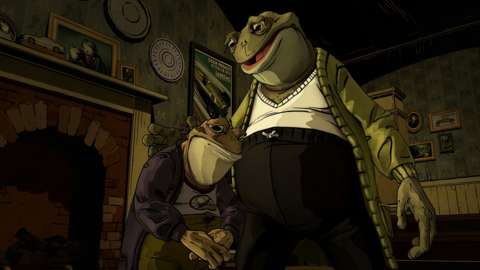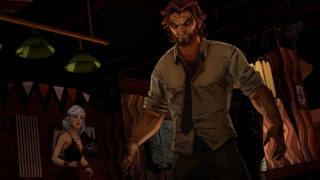In 2014, in a pop culture environment where “make it grim and gritty because we’re adults!” is the default and least-inspired approach to everything innocent that's ever been made, The Wolf Among Us feels right at home. That would be an insult if not for the fact that Telltale Games, by way of Bill Willingham's strong source material, is far too talented to waste the premise on violence and grim urban reality for its own sake.
The premise is this: The land in which all the figures of fairy tales and folklore reside has been overrun (by a shadowy figure called The Adversary, oddly not mentioned in the game), forcing a mass exodus into the mundane--i.e., human--world. The vast majority of them settle in Fabletown, conveniently located in Manhattan, and you follow the efforts of Fabletown's elite and its sheriff, Bigby Wolf, to keep this new home from falling apart.
Where the game and its source material diverge is in aim and tone. Fables the comic is very much a product of its medium; it's a series of one-off mysteries, random tales of fable life, and more traditional, comic book character studies, showcasing magic just behind the scenes of a real world. The Wolf Among Us, on the other hand, is less a story of what legends and folklore figures would do with the real world than a straight, neon-colored allegory, a Dennis Lehane nursery rhyme that uses the loss of a fairy tale homeland as a jumping off point to address issues of neighborhood class struggles and possibly the best exploration of immigration that isn't Papers, Please. It's sobering, sad, and tense, and occasionally, it even has time to be magical.



Taking place in 1986, nearly 20 years before the events of Fables, the game's story begins with the first genuine murder to occur in Fabletown in some time. Bigby is ordered by Ichabod Crane, Fabletown's ersatz, twitchy deputy mayor, to investigate quickly and quietly. What ensues, of course, is anything but. Very little's been shaken up from Telltale's well-understood template, and it really doesn't need to be. Each scenario brings you to a new area, where you collect items, speak to others, make decisions on how Bigby reacts, and face the occasional quick-time sequence for some truly stellar, hard-hitting fights and chases. After the options are exhausted, the story advances. The pace is functional, simple, and satisfying.
What The Wolf Among Us brings to the table is an injection of actual detective work. Investigation does not involve the obtuse puzzle solving of Sam and Max but more resembles a simplified L.A. Noire. Liars can be called out during conversations, faces can be read, evidence collected can tell you a story, and it is indeed possible to come to incorrect conclusions and incriminate the wrong people. There are scattered moments where characters might give you a different, kinder impression of someone who may be guilty, and the seed of doubt always comes at the worst possible time. There are a few scenes in which you get to play good-cop/bad-cop, forcing you to find just the right balance of intimidation, be it verbal or frighteningly physical, without causing a suspect to completely break or clam up. Many of these decisions cannot create meaningful or at least wholly undesirable fail states, but it shows the same improvement on that score that Season 2 of The Walking Dead does, where Bigby can make a bad decision in the moment or wait too long to act, resulting in some harsh consequences down the road or the loss of already fragile trust from another character.
This method of operation extends to the action sequences, where Telltale's penchant for QTEs gets more room to stretch, granting multiple options for handling hostile suspects and enemies as harshly as you see fit. When Bigby gets to wolf out in later episodes, your options become downright brutal. These later episodes, especially the final one, fall back on the mechanic more than is necessary, and it's unusual to fail in a truly meaningful way, but the game is far more Heavy Rain than Dragon's Lair when compared to Telltale's previous work. In essence, if you've played one Telltale game of late, you already know how you're going to take to The Wolf Among Us.
It's sobering, sad, and tense, and occasionally, it even has time to be magical.
As always, the strength of a Telltale game rides on its story, and it shines bright here. While the cel-shaded graphics are very much 1980s four-color comic pulp come to life, the aesthetic built within them has far more latter-day Michael Mann in its blood, capturing the density of 1980s’ New York along with the sense of dingy isolation, backed by a minimalist, appropriately synthy score. Somehow, it's able to convey this sense even when the game is at its most grand, be it in Fabletown's lavish business offices or the shadowy lairs of its elite caste of criminals.
More often than not, though, the game can convey it easily because we spend so much time with Fabletown's lower classes, the folks barely scraping by. On paper, this is a story of the Big Bad Wolf trying to atone for eating people's grandmothers, blowing down houses, and all the rest of his storied mayhem, but it is ultimately a tale of displaced people, second-class citizens whom other residents don't even acknowledge and just might happen to be Grendel, Snow White, Beauty and the Beast, and the Little Mermaid. It's a strong neo-noir that gets its hands dirty just as much from the grisly violence you're investigating as it does from the ugly first-world problems of its upper crust. It's the story of working poor vs. a harried elite, filtered through the lens of long-forgotten legends and folklore. There's a moment in which an increasingly frustrated Snow White is forced to deal with the complaints of the people directly and states, “We're at war! Don't they realize that?” Almost instantly, you can draw from the squalid bars that people hang out in, the makeshift, threadbare funerals under bridges afforded to dead fables because there's no way to bury their dead, and the contempt that fables have for a government that is woefully unable to provide, and know that the answer to Snow's question is an emphatic “no.” How much that fact plays into your decisions when it comes to bending the law to help out a fellow fable is all on you.

And therein lies the true game at the heart of The Wolf Among Us. If The Walking Dead was ultimately determined by how you have protected Clementine's soul, the same can be said for Bigby Wolf here. The once and future Big Bad Wolf in the comics is Wolverine wearing Sam Spade's trench coat. He's brusque, cold, and brooding, and his past misdeeds weigh on him constantly. The game's Bigby less resembles Wolverine physically and is closer to Sawyer from Lost, and even if you choose the most cold-blooded choices throughout the game, the Bigby of The Wolf Among Us is a different, lighter, more human character, and he is malleable. How do you handle how Mr. Toad is unable to afford a glamour throughout the game and might be deported with a very young, innocent son? How do you treat an injured troll knowing that you're responsible for her sister's death, and by nature of the crimes, there was no way you could've done more? There's a running motif of people speaking of the old land of fables as “the old neighborhood,” “the old times,” the same way you imagine someone haranguing the hero in one of Ben Affleck's Boston crime dramas, and most of these people don't forgive The Big Bad Wolf his misdeeds. Earning their trust determines how the final, crucial moments of the season play out, and the outcomes is less about the integrity of a single character than about the heart of a community. To play Bigby is to manage a city from the inside.
It's the kind of game where The Big Bad Wolf and the Woodsman who saved Red Riding Hood have a nostalgic, sad drink in a bar and talk about their troubles, and the fact that it can be such a quiet, pensive moment rather than a melodramatic joke is a testament to Telltale's work. It's a triumph of tight plotting, wild imagination, and sure-handed direction. It's a game that never flinches in taking its story and its chain-smoking protagonist everywhere it can. The kind of cop we leave Episode 5 with is more a product of his environment than perhaps any other Telltale protagonist so far. Fabletown will remember that, and so will you.